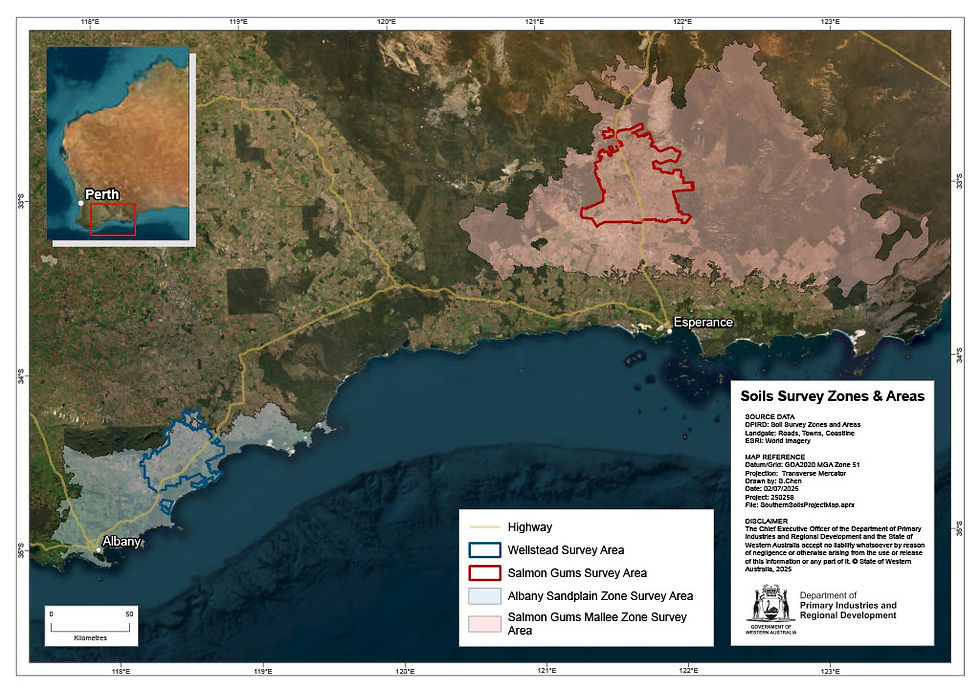National Vetch Breeder Visits WA: Highlights the value of vetch to reduce risk
- ASHEEP & BEEF
- Nov 14, 2023
- 3 min read
In October, the national vetch breeder Stuart Nagel from the South Australian Research and Development Institute (SARDI) visited Western Australia. The trip highlighted the value of vetch and the potential for its ongoing development to drive profitable and sustainable broadacre farming systems in WA, including by reducing the risk of growing a legume.
Stuart presented at the Pulse Association of the South East’s field day and AGM and then was taken on a tour of farms using vetch and vetch trials by DPIRD’s Principal Research Scientist, Mark Seymour.
Mark commented – “It was an extremely valuable few days for me and I believe local growers to touch base with Stuart, who sees vetches all over Australia and is such a key person in developing new varieties for Australian growers. I took Stuart to three of our DPIRD vetch trial sites at Wittenoom Hills, Lake Grace and Merredin, so he got to see vetches from a relatively kind environment at Wittenoom Hills through to tougher conditions at Merredin. The visit to Merredin highlighted how good vetches can perform in trying conditions."
"Western Australia’s wheatbelt is a harsh environment for legumes. Hostile soils and low rainfall often combine to produce variable growth. Vetches are one of the better adapted species to harsh conditions."
"Vetch seems to handle dry starts and variable soils as good or better than other legumes and is particularly well suited to sowing in dry or variable conditions. In addition, it is a multi-purpose plant that can be used for grazing, grown as a brown or green manure, cut for hay, or harvested for grain. Given the wide end use we are lucky that is a very widespread availability of different species and different varieties which fit most potential end uses. For example, for grain production the common vetch varieties are chosen as they produce a more marketable product, and even within the common vetches there are lines which flower very early such as Studenica through to quite late flowering lines like Morava.”
Growers in WA use vetch as a pasture. Mark and Simeon Roberts from Cascade have been using woolly pod vetch varieties as a pasture for nearly 20 years. They sow the woolly pod variety RM4 early in the year – often late February or March which allows them to have multiple grazing times. Generally, vetch can be grazed from end of April through to the mid-November when stubbles come online. Vetch sets up their cropping phase and now their rotation is generally Vetch/Wheat/Canola/Wheat/Barley then back to vetch again. Mark Roberts commented that “using vetch as a pasture adds diversity and risk management to a cropping system. It allows a portion of the crop program to have all nitrogen applied at planting as there is surplus organic N to requirement, hence a very easy portion of the program to manage. The grazing in the system so far has also mitigated any mouse or snail control.”
The Roberts family have always been strong supporters of research and breeding. Mark Roberts commented “It’s important that Stuart Nagel’s vetch breeding program continues to be supported by GRDC and state governments. We need access to new varieties that grow even better in lower rainfall areas, handle stress and are less prone to foliar diseases such as chocolate spot.”
DPIRD’s Mark Seymour also sees improved disease resistance as a key trait to try and improve in vetch. “Particularly if you are not grazing your vetch, foliar diseases really take off in the dense humid canopies that vetch can produce in late winter and Spring. You can try and mange diseases with fungicides, but it is hard to get the chemical into the canopy as the season progresses, so genetic resistance is required.”
Mark Roberts was recently visited by respected South Australian consultant Allan Mayfield who was conducting a survey and review of vetches for GRDC. “I am really keen to hear about the results of this review and hope that it provided guidance to GRDC on the excellent fit of vetches in our system and the importance of supporting the Vetch breeding program”, he said.




